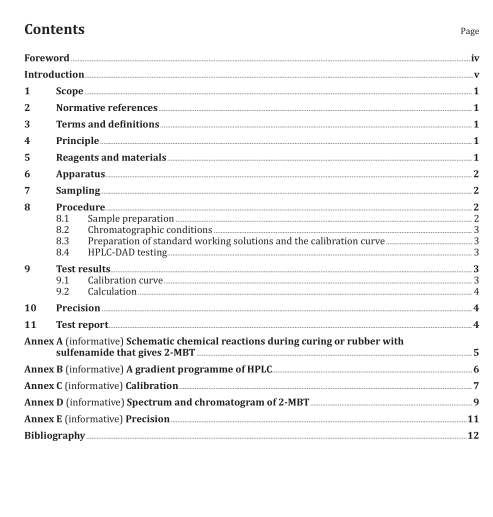ISO 21490:2022 pdf free download.Rubber and rubber products — Determination of 2-mercaptobenzothiazole content by high performance liquid chromatography (HPLC)
This document specifies a quantitative test method to determine the 2-mercaptobenzothiazole content in rubber and rubber products by high performance liquid chromatography (HPLC).
This document delivers a method for quantifying 2-mercaptobenzothiazole in rubber products for a better selection of curing conditions.
This document provides a method to follow the curing of rubber with sulfur- and benzothiazole-based accelerators using a chemical measurement which is complementary to the classical rheometric technique.
2 Normative references
The following documents are referred to in the text in such a way that some or all of their content constitutes requirements of this document. For dated references, only the edition cited applies. For undated references, the latest edition of the referenced document (including any amendments) applies.
ISO 3696, Water for analytical laboratory use — Specification and test methods
ISO 4661-2, Rubber, vulcanized — Preparation of samples and test pieces — Part 2: Chemical tests 3? Terms? and? definitions
No terms and definitions are listed in this document.
ISO and IEC maintain terminology databases for use in standardization at the following addresses:
— ISO Online browsing platform: available at https://www.iso.org/obp
— IEC Electropedia: available at https://www.electropedia.org/
4 Principle
The 2-mercaptobenzothiazole in rubber is ultrasonically extracted with a chloroform-methanol solution determined and confirmed with HPLC-DAD (high performance liquid chromatography equipped with a diode-array detector).
NOTE There is a risk of neo-formed MBT from MBTs if a thiazole accelerator is used in the formulation of the sample.
5 Reagents and materials
Unless otherwise specified, analytical grade chemicals should be used. Water shall be distilled or deionized to fulfil grade 3 in accordance with ISO 3696.
5.1 Methanol, of analytical grade.
8.2 Chromatographic conditions
Since the test results depend on the equipment that is used, there are no universal parameters for chromatographic analysis (see example in Annex B). The following parameters have been proven to be suitable for testing as reference:
— column: C18, 5 µm, 4,6 mm × 250 mm or chromatographic column with the similar performance;
— temperature of column: 35 °C;
— wavelength range: 200 nm to 400 nm;
— test wavelength: 320 nm;
— mobile phase A (water containing 1 % acetonitrile) and mobile phase B (acetonitrile);
— flow rate: 1,0 ml/min;
— injection volume: 10 μl.
8.3 Preparation of standard working solutions and the calibration curve
Weigh 100 mg of a 2-mercaptobenzothiazole standard material and put it into a 100 ml volumetric flask. Fill the flask with methanol to obtain a 1 mg/ml standard stock solution. The standard stock solution is diluted with methanol stepwise into 0,005 mg/ml, 0,010 mg/ml, 0,020 mg/ml, 0,030 mg/ml and 0,050 mg/ml standard working solutions (see example in Annex C).
Inject those solutions using the analytical conditions described in 8.2, and the calibration curve is obtained by plotting the peak area of each standard against their concentration. Because of the instability of MBT, standard working solutions shall be analysed without delay to avoid systematic errors in the calibration.
8.4 HPLC-DAD testing
Filter the solution through the filtration membrane for HPLC detection.
Analyse the sample solutions (10 µl) and standard working solutions (10 µl) by HPLC-DAD separately.
To ensure that the peak of response in the extracts is indeed 2-mercaptobenzothiazole, it is necessary to verify that the retention time and the UV-visible spectrum of the peak are identical for the extracts and standard solutions (see example in Annex D).
A blank test shall be carried out in parallel with the determination. The blank test is performed according to 8.1 but omitting the test sample.
To avoid column damages, appropriate measures should be taken such as washing the column after testing.
9 Test results
9.1 Calibration curve
The linear calibration equation is determined by plotting the standard working solution concentration (ordinate) against the peak area (abscissa). An example of a calibration curve is given in Annex C.Through the least square fitting, the linear determination coefficient R 2 should be greater than 0,995.ISO 21490 pdf download.ISO 21490 pdf download
